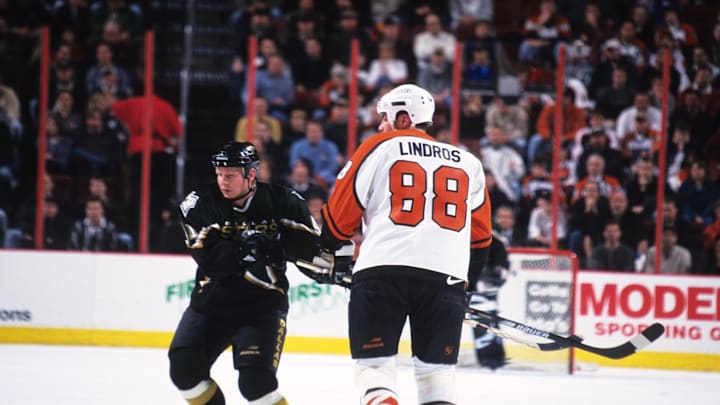As Isaac Howard, the Michigan State star and former Tampa Bay first-round pick, holds out from signing an entry-level deal with the Lightning, the question arises: Should the Flyers consider trading for him?
It is a reasonable question to ask, given that the loss of Cutter Gauthier still stings a team desperately needing a young, top-end center. It also brings back memories of how the biggest holdout in NHL history brought Eric Lindros to Philadelphia.
There is no real benefit to making Flyers fans relive the pain of watching the Avalanche win multiple Stanley Cups after Quebec took the assets of the Lindros trade and fled to the Rocky Mountains. We definitely do not need to talk about the Hall of Fame career Peter Forsberg had in Colorado, either. Lindros had a memorable NHL career, but let's look at the side effects of the deal.
Rookie Salary Cap Reform
In 1992, Eric Lindros signed a five-year rookie contract that totaled $24 million, including bonuses and endorsements, with an annual base salary of $3.5 million. It was the largest rookie contract in NHL history and, barring any major changes to the CBA, it always will be.
Author Todd Denault wrote about the Lindros contract in his book, A Season in Time. Per Stu Cowan, Denault wrote:
"The contract also stipulated that if the average salary of the three highest-paid players in the NHL (with the notable exception of Wayne Gretzky) exceeded Lindros’s, he would immediately get a raise to that amount.”
A mere handful of days before the start of the 1994-95 season, a league-wide lockout began. The previous season had been played without a Collective Bargaining Agreement (CBA) in place, and many franchise owners were unwilling to move forward without change. Lindros was part of the reason why.
The salaries of unproven rookies were getting out of hand, and not every organization could keep pace with big market teams like the Philadelphia Flyers and its former owner, Ed Snider, who was willing to pay whatever it cost to bring another championship to the city. The "rich get richer" mentality did not sit well with many. As a result, a rookie salary cap was put in place with a maximum $850,000 annual salary, which included a signing bonus. Performance bonuses were allowed, but limited. Entry-level contracts (ELCs) could be no more than three seasons in length.
Trade Calls
The Lindros trade was a well-documented debacle in which the Quebec Nordiques traded the future superstar to both the Philadelphia Flyers and New York Rangers. An outside arbitrator was brought in to resolve this situation, which revealed the league's vague rules about what constituted a trade. Sportsnet wrote about it in a piece called How L’Affaire Lindros gave birth to the NHL’s trade call. In it, Larry Bertuzzi, the outside arbitrator, was quoted as saying:
“I asked one simple question: give me all the written materials about what constitutes a trade… and any background information I needed to know,” he said. “I was handed a single sheet of paper, with two lines on it, saying if there was a dispute over a trade it would be settled by the league president or an independent arbitrator.”
The league's brass might as well have simply shrugged their collective shoulders.
Since then, all trades must be submitted to the NHL's central registry for review and approval. One wonky fax machine aside, the process has been much smoother.
Bettman Forever?
In 1993, the NHL created a Commissioner role and elected Gary Bettman to the role, which he still holds to this day. While the role was not created as a direct result of the actions of Eric Lindros, his holdout in Quebec was one of many frustrating factors that played into the league's desire for change.
A Ban on Cash Trades
Eric Lindros and Wayne Gretzky set record highs for cash involved in trades, each involving $15 million sent in the deal. 13 years after the trade sent Big E to Philly, the NHL instituted a ban on cash trades as part of the 2005 CBA. Had Bertuzzi ruled in favor of the Rangers' trade offer for Lindros, $30 million would have gone to Quebec.
Eerie Lincoln-Kennedy Coincidences
The great nephew of Larry Bertuzzi, the trade arbitrator, is Todd Bertuzzi, who sucker punched Steve Moore of the Avalanche and broke his neck in the process. Bertuzzi served a lengthy suspension, was charged with assault in British Columbia, and was sued twice by Moore.
Additionally, an asset from the Lindros trade was used by the New York Islanders to draft Brett Lindros, Eric's younger brother, ninth overall in 1994. Brett played 51 total games in the NHL, amassing seven points and 147 penalty minutes over two seasons. Like his brother, he suffered a series of concussions that cut his career short.
If you would like to learn more about the Lindros trade trees, Steve Dangle does a great job discussing it.
